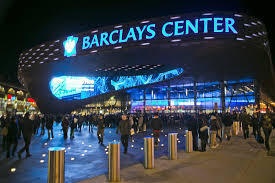[simpleviewer gallery_id=”185″]
On the evening of December 8, protestors gathered outside Barclay Center to speak out about police violence and the status of race relations in New York City, in the wake of the grand jury’s controversial decision not to indict the police officer involved in the death of 43-year-old Eric Garner. The rally represented the sixth consecutive “die-in” in New York, and the first major rally in Brooklyn—a borough that has a 34.2% black population.
Of course Garner, like Michael Brown in Ferguson, Missouri last August, and Akai Gurley—shot to death by a policeman in the stairwell of the Louis Pink Houses in East New York on November 20—was black. These incidents and others have sparked a nationwide conversation on the relationship between black citizens and the police. It’s a moment that is sparking not just demonstrations but reflection, and The Brooklyn Ink sought out some of the young black demonstrators to ask about how these events have been shaping their thinking in subsequent days, as the sound of the protests begins to fade away.
Reginald Spruill, 22, an architectural student at City Tech who lives in Fort Greene, said it felt good to see a rally in Brooklyn. “It’s something unique about a race rally in Brooklyn because even though we might not be the majority, we feel like it,” he said. “The killing of so many black men this year has really forced me to reflect as an individual. My father was a police officer for 30 years before he retired and he always told me that even though a majority of police officers are honorable, there is also a handful that is not. He cautioned me to stay away from these types and to protect myself buy being polite and never getting physical with them. But now I have to take that advice with a grain of salt because cops, as these killings have shown, can kill black men who are respectful and nonviolent and get away with it. So now how do I protect myself? Through this rally and through demonstrations that demand for justice.”
Garner’s final words—“I can’t breath”—have taken on a life of their own after his death. “When one of us can’t breathe, we all can’t breathe,” said Jamal Thomas, a fellow Brooklyn native. Thomas, 22, is a teacher at Uncommon Schools in Brooklyn who lives in Fort Greene. “When one of us is denied justice, we’re all denied justice.”
Back on December 8, as Thomas and thousands of others raised signs and slogans in the air, the rally served as a reminder that even though Eric Garner, a black man, was killed on July 17, a community filled with all races came together to protest. “Justice is a colorless issue,” Thomas said. “Every person has a right to justice through law and that is why you see so many people of different races out here today. The grand jury did not provide justice when it did not indict the police officer responsible for his [Eric Garner’s] death. That is why we as a community are outraged. And that is why we as a community are going to protest until we see some tangible change.”
It is this approach that Thomas believes will heal a New York City that he believes has suffered from police brutality and racial profiling for years. “We as black men have lived with this reality for so long—you have to be extra careful around police or something might happen—that it is refreshing to know that we are not alone anymore. We have voices that matter,” Thomas added.
On December 8, people from all races crowded around the Barclay Center. James Jeter, a concept design stylist at Ralph Lauren who lives in Crown Heights, said that black men “have a unique and special connection to this cause and effort, because we look like Eric Garner. We sound like Eric Garner. We walk like Eric Garner.
“But that does not mean that we are the only ones who feel his pain,” he added. “Other people here might not look like Eric Garner, but they bleed like him. This demonstration has definitely opened my eyes to the idea that we are fighting a battle that is bigger than race, even though race still plays a huge part.
“My hope is that people who aren’t black and who witnessed police brutality towards a black person for the first time on the Internet, and not in real life, continue to see that black people have not been making these things up. We have dealt with this for so long that unfortunately, we are not surprised by these incidences anymore.
“And we have dealt with this for too long that we are finally fed up,” Jeter concluded.
That seemed to be a prevailing message at the demonstration. Protestors chanted in unison, “Black lives matter! Black lives matter!”
“The way we honor Eric Garner’s death, the way we ensure that he did not die fruitlessly, is to change as a community,” Brennan Towe, 24, of Bed-Stuy said. “After these rallies die down, we have to continue our change efforts—we can’t be complacent. We’ve accepted these realities for too long and it’s empowering to know that we will no longer accept them. We’ve planted the seed today, and through other die-ins, that will grow and produce change,” he added.
“Hopefully, when I’m ready to have a child, and he’s old enough,” Towe said, “I can tell him that these demonstrations are a part of the reason he doesn’t have to worry about a police officer mistreating him.”


Leave a Reply